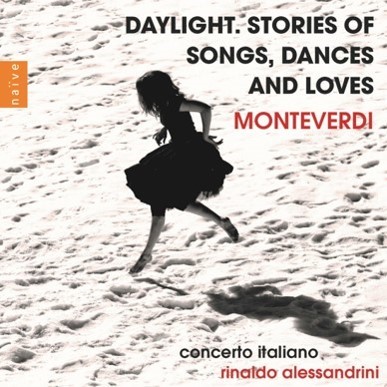Stories of songs, dances and loves
Concerto Italiano, Rinaldo Alessandrini
61:47
Naïve OP7366
Click HERE to buy this CD at amazon.com
[These sponsored links are your only way to support the record company and to keep this FREE website alive…]
This collection forms an ancillary to ‘Night. Stories of Lovers and Warriors’, which was performed live and recorded to celebrate the 450th anniversary of Monteverdi’s birth in 1567. In an introductory note Rinaldo Alessandrini suggests that this disparate programme is perhaps not intended for purists. Well, I’ve been called a purist – a term incidentally that I do not take to be derogatory – on more than one occasion and found the CD totally irresistible.
There are two principal reasons for that. Firstly one can point to the consummate skill with which the programme has been assembled, bringing relevant music, much of it familiar, from across the whole of Monteverdi’s output and creative life to create a narrative. More on that anon. Then there is the sheer quality of the performances. Over the years the constitution of Alessandrini’s Concerto Italiano has inevitably changed, here indeed even since the recording of ‘Night’, but all five singers employed in the madrigals and other ensemble pieces are outstanding, blending superbly without ever losing individuality. The instrumental playing is equally impressive.
The programme begins with the Sinfonia that opens act 3 of Orfeo, thus providing a link to the earlier disc, which started in the same way, before the marvellous two-part madrigal ‘Non si levava … E dicea l’una sospirando’ (from Book 2, 1590), which depicts a Romeo and Juliet scenario as two lovers awaken to the dawn after a night of passion. This is music of the utmost sensuality, using exquisite dissonance to convey the blissful eroticism of the sentiments expressed in Tasso’s marvellous text. The mood lightens to a trio of three-part pieces, interspersed by instrumental works including the first of several dances by Biagio Marini – all urging shepherds and birds to rise and get the day underway. The singing here achieves a delicious lightness of touch that serves to mask the consummate execution of performance. Among other favourites too numerous to mention in detail are ‘Zefiro torna’ (Scherzi musicali, 1632) and the canzonetta ‘Chiome d’oro’ (Madrigals Book 7, 1619). Most of the items are brief but a sense of symmetrical structure is given by the inclusion of two scenes from the late operas, both concerned with the amorous exploits of servants. From Il ritorno d’Ulisse in Patria we get the flirtatiously playful scene in act 1 between Penelope’s maid Melantho and Eurymachus, beautifully sung and vocally acted by soprano Sonia Tedla and tenor Valerio Contaldo, which is counterbalanced by that for the innocent (or maybe not so innocent ) page Valletto and Damigella (damsel) from act 2 of L’incoronazione di Poppea, equally enticingly played out by soprano Monica Piccinini and tenor Raffaele Giordani. There is a sense of exuberant, scintillating joie de vivre about the whole programme that would sweep away the bluest of moods. Recommended without reservation.
Brian Robins
